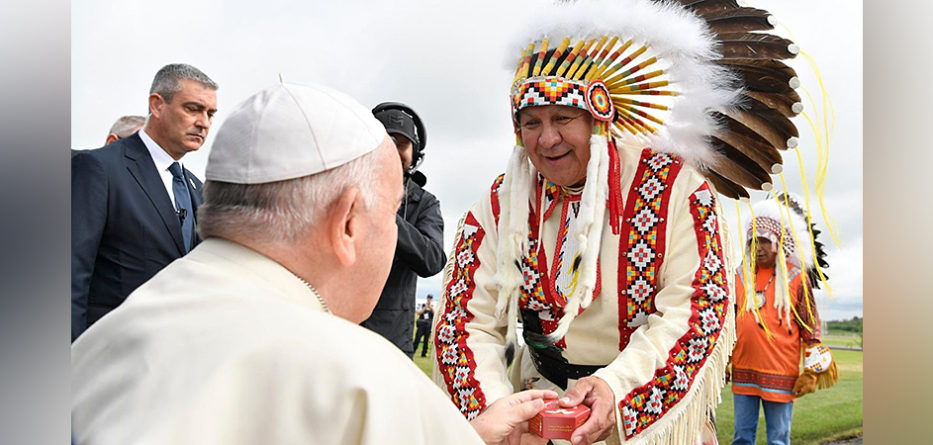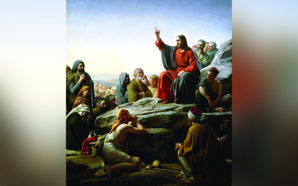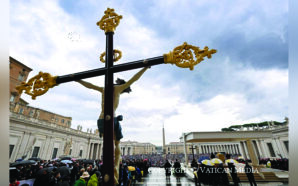Homily for the 18th Sunday in Ordinary Time Year C
Readings: Ecclesiastes 1:2, 2:21-23; Psalm 89(90):3-6, 12-14, 17; Colossians 3:1-5, 9-11; Luke 12:13-21
31 July 2022
Today is not only the 18th Sunday in Ordinary Time; it is the feast of Saint Ignatius of Loyola.
You will recall that we commenced the Ignatian year on 20 May 2021, marking the 500th anniversary of the moment when Ignatius the soldier was injured by a cannonball in the Battle of Pamplona. The Year concludes today, the feast day of St. Ignatius. The peak of the celebration fell on 12 March 2022, the 400th anniversary of the canonisation of St. Ignatius and St. Francis Xavier. Preaching on the 400th anniversary of the canonisations, the Jesuit Pope Francis said:
“We are called to go precisely there, to the border between heaven and earth where men and women ‘confront’ God with their difficulties, so that we in turn can accompany them in their restless seeking and their religious doubt. That is where we need to be, and to do so, we have to go outwards and upwards. The enemy of human nature would persuade us to keep to the path of empty but comfortable routines and familiar landscapes, whereas the Spirit impels us to openness and to a peace that never leaves us in peace. He sends disciples to the utmost limits.”[1]
LISTEN: https://soundcloud.com/frank-brennan-6/homily-31722
Meeting people with their difficulties, accompanying people in their restless seeking and their religious doubt. Going to the utmost limits. That’s the call to each of us. The temptation, particularly in times of ageing and diminishment in our church is to remain in “empty but comfortable routines and familiar landscapes” – those places where the rich man in today’s gospel builds his bigger barns for storing his grain, storing up treasure for himself in place of making himself rich in the sight of God.
Pope Francis, now wheelchair-bound, went to the utmost limits this week when he headed to Canada, first going to Maskwacis in the province of Alberta to meet with the indigenous peoples. Later in the week, he flew across to Quebec, where he told church workers that they had a choice between adopting a negative view of the world and a discerning view of the world. He drew the now familiar distinction between secularisation which is a good thing and secularism which is a bad thing. He invited his listeners to draw inspiration from Pope Paul VI’s apostolic exhortation Evangelii Nuntiandi, in which he explained that secularisation is the effort to discover the laws governing reality and human life implanted by the Creator, which “in itself (is) just and legitimate and in no way incompatible with faith or religion”[2]
Drawing on the writings of the Canadian philosopher Charles Taylor, Francis told his audience:
“[T]he real issue of secularization, for us Christians, should not be the diminished social relevance of the Church or the loss of material wealth and privileges. Rather, secularization demands that we reflect on the changes in society that have influenced the way in which people think about and organize their lives. If we consider this aspect of the question, we come to realize that what is in crisis is not the faith, but some of the forms and ways in which we present it. Consequently, secularization represents a challenge for our pastoral imagination, it is ‘an occasion for restructuring the spiritual life in new forms and for new ways of existing’.[3] In this way, a discerning view, while acknowledging the difficulties we face in communicating the joy of the faith motivates us, at the same time, to develop a new passion for evangelization, to look for new languages and forms of expression, to change certain pastoral priorities and to focus on the essentials.”[4]
Francis, like the preacher in Ecclesiastes, declares, “Vanity of vanities. All in vanity!” In the church, we too can be like the man who labours wisely, skilfully and successfully storing up wealth, status and power for ourselves, only having to leave it all to one who has not toiled for it at all. We are called to a deep interior freedom, not clinging to wealth, status or power, preferring “to imitate and be more actually like Christ our Lord, wanting and choosing poverty with Christ poor rather than riches, opprobrium with Christ replete with it rather than honours; and desiring to be rated as worthless and a fool for Christ, who first was held as such, rather than wise or prudent in this world”.[5]
This week, Francis displayed that deep interior freedom and Ignatius’s third degree of humility when he apologised unreservedly to the indigenous peoples of Canada at his first meeting with them saying, “Although Christian charity was not absent, and there were many outstanding instances of devotion and care for children, the overall effects of the policies linked to the residential schools were catastrophic. What our Christian faith tells us is that this was a disastrous error, incompatible with the Gospel of Jesus Christ.”[6]
At his last meeting with the indigenous peoples he then said:
“I have come to Canada as a friend in order to meet you and to see, hear, learn and appreciate how the indigenous populations of this country live. I have not come as a tourist. I have come as a brother, to discover firsthand the good and bad fruit borne by members of the local Catholic family in the course of the years. I have come in a spirit of penance, to express the pain that we carry in our hearts as Church for the wrong inflicted on you by not a few Catholics who supported oppressive and unjust policies in your regard. I have come as a pilgrim, despite my physical limitations, to take further steps forward with you and for you. I do this so that progress may be made in the search for truth, so that the processes of healing and reconciliation may continue, and so that seeds of hope can keep being sown for future generations – indigenous and non-indigenous alike – who desire to live together, in harmony, as brothers and sisters.”[7]
As we mark the end of the Ignatian year, may the witness of our Jesuit pope in Canada help us here in Australia to be responsive to the calls for Indigenous constitutional recognition. Yesterday, at the Garma Festival, our Prime Minister announced a proposed constitutional amendment, saying, “Enshrining a Voice in the Constitution gives the principles of respect and consultation, strength and status. Writing the Voice into the Constitution means a willingness to listen won’t depend on who is in government or who is Prime Minister”. He spoke of the need to be “working together, with humility, with hope.”[8]
There’ll be a lot of complex politics in the months ahead as we seek a formula of words to insert in our Constitution – a formula acceptable to the broad range of political opinions in our Parliament, a formula embraced by the country’s Indigenous leadership, and a formula approved by an overwhelming percentage of us the people. It’s a big call. As I’ve often said, there’s no such thing as a small change to our Constitution. For us as church, that’s not just a political challenge. Adopting a discerning view rather than a negative one towards novel developments in our nation, this is also a challenge for our pastoral imagination.
Fr Frank Brennan SJ is the Rector of Newman College, Melbourne, and the former CEO of Catholic Social Services Australia (CSSA). He has been appointed a peritus at the Fifth Plenary Council of the Australian Catholic Church.
[1] Pope Francis, Homily, 400th Anniversary of the Canonization of St. Ignatius of Loyola, 12 March 2022 available at https://www.vatican.va/content/francesco/en/homilies/2022/documents/20220312-omelia-400-ignazio-loyola.html
[2] Pope Paul VI, Evangelii Nuntiandi, 55
[3] C. Taylor, A Secular Age, Cambridge 2007, p. 437
[4] Pope Francis, Homily, Vespers with Bishops, Priests, Deacons, Consecrated Persons, Seminarians and Pastoral Workers in the Cathedral of Notre Dame in Québec, Basilica of Notre-Dame de Québec, 28 July 2022 available at https://www.vatican.va/content/francesco/en/homilies/2022/documents/20220728-omelia-vespri-quebec.html
[5] Ignatius of Loyola, ‘Three Kinds of Humility’, Spiritual Exercises, [167]
[6] Pope Francis, Address, Meeting with Indigenous Peoples: First Nations, Métis and Inuit, Maskwacis, 25 July 2022 available at https://www.vatican.va/content/francesco/en/speeches/2022/july/documents/20220725-popolazioniindigene-canada.html
[7] Pope Francis, Address, Meeting with a Delegation of Indigenous Peoples in Québec, 29 July 2022 available at https://www.vatican.va/content/francesco/en/speeches/2022/july/documents/20220729-delegazione-indigeni-quebec.html
[8] Anthony Albanese, Address to the Garma Festival, 30 July 2022, available at https://www.pm.gov.au/media/address-garma-festival








